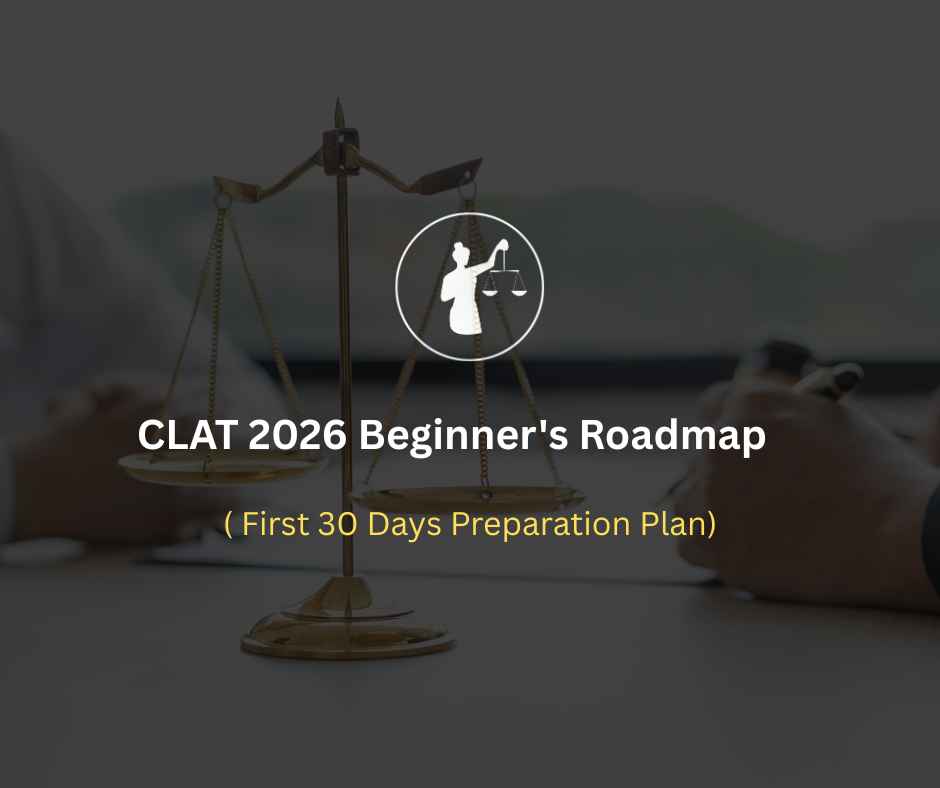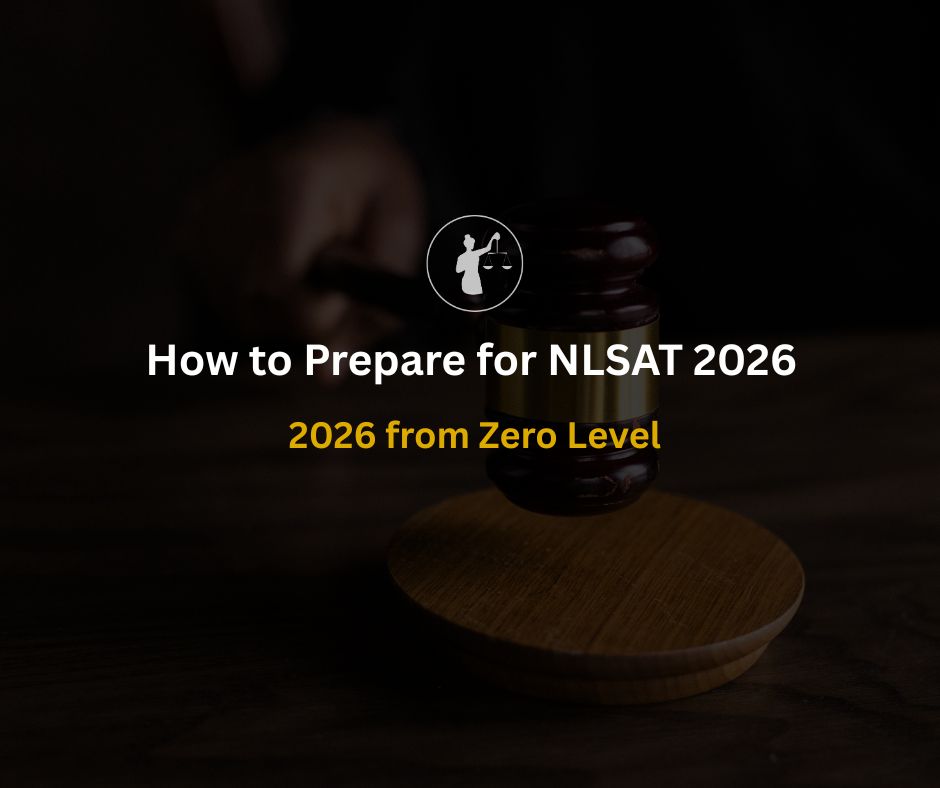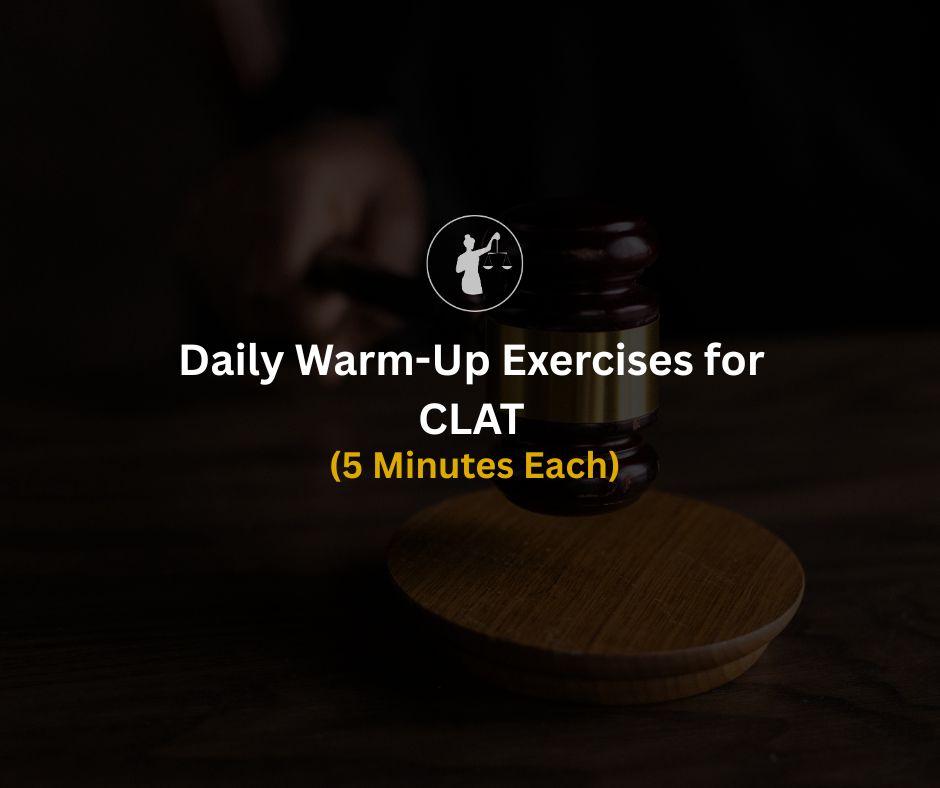
Summary:
Just starting CLAT prep? Your first 30 days matter the most. This guide breaks down what subjects to study, what habits to build, and how to avoid beginner mistakes. Learn how to set a strong base for CLAT 2026 with a daily plan, study strategy, and free prep resources that actually work.
If you're a CLAT 2026 aspirant just beginning your journey, the most common question is: where do I even begin?
The first 30 days aren’t about speed. They’re about direction. A strong start prevents burnout and confusion later.
Start slow, stay consistent, and focus on understanding, not memorising. You’re not behind if you're starting now.
You’re early if you’re intentional.
Study the CLAT UG pattern: 120 MCQs across English, Current Affairs & GK, Legal Reasoning, Logical Reasoning, Quantitative Techniques.
Understand marking: +1 for each correct answer, –0.25 for wrong ones, no penalty for unanswered.
Go through last 3 years of CLAT question papers to identify trends in difficulty and section distribution.
Use an official-style mock test. Treat it like exam day: 2 hours, no interruptions.
Calculate section-wise accuracy and identify problem areas.
Log errors and categorize them: misread, time pressure, lack of concept.
Decide your core study slots: minimum 3–4 hours daily, broken into 1-hour focused sessions on each section.
Map out 4 weekly cycles covering all five sections.
Allocate two days for scheduled mock + detailed review.
Reserve Sundays for consolidation and break.
Read More :CLAT 2026 Preparation with Free Resources
English Language
Read one editorial (450‑500 words) daily: The Hindu, Indian Express.
Complete one RC practice set per day.
Keep a mini vocabulary log for unfamiliar words.
Current Affairs & GK
Start curated CA sources like NLTI’s weekly digest.
Build a one-page GK summary every day covering national news, legal developments, and international events.
Revise your daily sheet before bedtime.
Legal Reasoning
Learn to interpret legal principles. Read 2 basic principles per day (e.g. consent, breach).
Practice one “principle + facts” question daily.
Maintain a “mistake log”: record where you applied outside knowledge or moral bias.
Logical Reasoning
Focus on Assumptions and Inferences.
Solve 15 questions daily.
Take time to write one-line reasoning for each answer.
Quantitative Techniques
Choose one topic like Percentage or Ratio.
Spend daily 30–45 minutes on 10 practice questions.
Practice mental math: tables, percentage tricks, approximation.
Day 15: Take Mock 2
Review errors from Mock 1.
Simulate mock under timed conditions.
Day 16–17: Deep Review
Identify recurring mistakes.
Write short notes explaining the correct principle or method for each error.
Share doubts in your study group or Telegram
Day 18–19: Section Speed Rounds
Do time-bound sectionals: 20 RC in 20 minutes, 25 Legal Reasoning in 25 minutes.
Log the time per question to identify slow areas.
Day 20–21: Strengthen Quant and GK
Build three short sets of 10 advanced CA questions.
Solve a Quant drill of mixed topics (10–15 questions).
Track all correct and wrong answers.
Day 22: Mock 3 + Self-Review
Complete the mock in exam conditions.
Check against your earlier diagnosis to see your progress.
Day 23–24: Pattern Spotting and Time Logging
Review where you spent most time.
Use timed analysis to reorganize strategy.
Day 25–26: Consolidation Sessions
Combine one RC with one LegalReasoning passage.
Discuss options with peers to cross-check your reasoning.
Day 27–28: Quant Quick Hits and GK Recap
Refresh main formulae while solving quick practice sets.
Make a one-page GK sheet covering this month’s major news.
Day 29–30: Final Mix & Plan Month 2
Solve one mini mock (50‑question mix).
Write a weekly improvement plan for next 30 days based on Month 1 metrics.
Read More: CLAT and AILET 2026 Clash: Key Updates for Aspirants
Don’t get stuck in lengthy resources. One good source trumps multiple average ones.
Don’t delay mocks, they highlight structural flaws early.
Don’t isolate subjects completely, integrate RC + Legal logic sessions.
Don’t miss error logs; they are your personalized roadmap.
1. Structured but realistic, balanced across all sections.
2. Built-in assessment monthly mocks with immediate diagnostics.
3. Daily accountability error logs, topic summaries, time logs.
4. Modular improvement week-by-week focus on concepts, speed, and analysis.
Intensify to 2 mocks per week
Drill weaker sections for 45 minutes daily
Start combining mock analysis with time strategy reviews
Use your ELQ (error-log quotient) to track growth
Structured beginner plans: NLTI provides clear 30–60–90 day study plans tailored for CLAT 2026 beginners.
Free classes on YouTube: Access high-quality subject-wise sessions at no cost to build strong fundamentals.
Expert-made mock tests: Practice with mocks that replicate actual CLAT difficulty and format.
Daily GK + legal updates: Stay consistent with curated content, not scattered news links.
Mentorship support: Talk to real mentors who guide you beyond academics, schedule, strategy, and consistency.
Doubt-solving ecosystem: Telegram and live sessions ensure your questions never stay unanswered.
Affordable quality: Whether you're just starting or already serious, NLTI offers value without overpriced packages.
1. When should I start preparing for CLAT 2026?
Ideally, start at least 18 months before the exam to build a strong foundation and avoid last-minute pressure.
2. Do I need coaching from the beginning?
Not necessarily. Start with self-study, but join structured mentorship or guidance once you're clear about your weaknesses.
3. Which subject is the hardest for beginners?
Legal Reasoning and Current Affairs usually confuse beginners. They're easy once approached with the right strategy.
4. How many hours should I study daily in the first month?
Start with 3–4 hours a day, including reading, concept-building, and light mocks. Gradually increase intensity.
5. Can I clear CLAT without legal background or prior coaching?
Yes. Many toppers have cleared it with pure discipline, mocks, and structured self-prep.
6. Is newspaper reading mandatory?
Yes, for GK and reading speed. But supplement it with curated monthly compendiums like NLTI's GK.
7. How do I track my progress in the first month?
Take one mock a week, maintain an error log, and revise what you got wrong.
8. Do I need to study Math daily?
Not daily in the first month. 2–3 days a week is fine for beginners to build comfort.
9. What’s the best beginner-friendly booklist?
Use the CLAT consortium PYQs, NLTI's curated resources, and topic-wise practice sheets. Avoid overwhelming prep books early on.
10. What if I miss a few days in the plan?
Don’t panic. Resume where you left off. Consistency beats perfection in CLAT prep.





